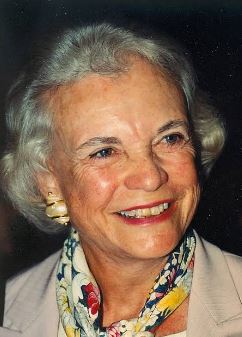Trailblazer and Jurist: Remembering Sandra Day O’Connor (1930-2023)

Sandra Day O’Connor, the pioneering figure who made history as the first woman to serve on the United States Supreme Court, passed away at the age of 93. The Supreme Court announced her death on Friday, marking the end of an era that saw O’Connor shatter glass ceilings and leave an indelible mark on American jurisprudence.
Born on March 26, 1930, in El Paso, Texas, O’Connor’s early life was characterized by determination and resilience. She grew up on her family’s ranch in Arizona, facing limited educational opportunities but never letting them hinder her ambition. A brilliant student, she graduated high school at 16 and went on to Stanford University, where she earned a bachelor’s degree in economics and later a law degree, graduating third in her class. Despite the challenges of a male-dominated legal field, O’Connor’s career was a story of perseverance and excellence, as she climbed from San Mateo Deputy County Attorney to becoming Arizona’s assistant attorney general and eventually a state court judge.
In 1981, in a move that would change the face of the Supreme Court, President Ronald Reagan nominated O’Connor as an associate justice. Garnering unanimous confirmation from the U.S. Senate, she broke new ground as the first female justice. O’Connor was known for her moderate conservative stances but was also recognized for her independence, notably in her pivotal role in a 5-4 ruling that upheld Roe v. Wade in 1992. Her judicial philosophy often reflected a careful balance, respecting precedent while also bringing a pragmatic approach to her decisions.
After retiring from the Supreme Court in 2006 to care for her ailing husband, O’Connor continued to engage in public service. She founded iCivics in 2010, an educational initiative focused on teaching civics to secondary students through interactive methods. Her commitment to civic education and her belief in the importance of public engagement were hallmarks of her post-judicial life. “It’s not enough to understand, you’ve got to do something,” O’Connor once said, emphasizing the value of active participation in democracy【19†source】.
O’Connor’s contributions to the nation were recognized in 2009 when she was awarded the Presidential Medal of Freedom by President Barack Obama. In 2018, she disclosed her diagnosis of the early stages of dementia, likely Alzheimer’s disease, and withdrew from public life. Reflecting on her legacy, O’Connor hoped to have inspired young people in civic engagement and to have paved the way for women in their professional journeys.
Sandra Day O’Connor’s death is not just the passing of a former Supreme Court Justice; it’s the end of a chapter in American history. Her life and career embodied the spirit of progress, resilience, and dedication to the rule of law, leaving a legacy that will continue to inspire generations to come.





